The stories of Bruno Dutra, from Niterói (RJ), and Filipe Ferreira, from Itapema (SC), are deeply connected. Both grew up engaging in outdoor activities, which were interrupted by motorcycle accidents that left them in wheelchairs. As adults, Bruno longed to return to Costão do Itacoatiara, while Filipe dreamed of reaching Pico da Pedra. Thanks to inclusive projects, both were able to relive inspiring moments.
Including people with disabilities in mountains, trails, and waterfalls not only promotes equal opportunities, but also contributes to physical and mental well-being. For some, accessibility represents the continuation of a lifestyle they had before the disability. For others, it’s a chance for a fresh start—recovering self-esteem and confidence, and fostering social integration.
“After experiencing the outdoors, people with disabilities come back to life, emerging from states of isolation and depression. Many even reactivate their social media to share inspiring moments and influence others,” says Alan Jacob, founder of Voluntários da Montanha.
Patricia Mira, from the NGO Montanha em Movimento, says it’s common to receive testimonials from people who hadn’t left their homes in years. “When people with disabilities leave a place where they feel incapable, they begin to believe in themselves. Inclusion is transformative. It’s liberating.”
According to psychologist, neuropsychologist, and PhD and MSc in Science from the USP School of Medicine, Andrea Lorena da Costa Stravogiannis, promoting accessibility is essential for people to develop and enhance their social skills. “A study showed that contact with nature reduces mental rumination—the habit of dwelling on the same thoughts, usually negative. In addition, it improves mood, promotes a sense of belonging, and boosts resilience.”
Andrea also emphasizes that nature programs can help reframe a person’s relationship with their body and capabilities, contributing to the reconstruction of their self-image and autonomy.
Despite numerous challenges and barriers, the participation of people with disabilities in hiking and mountaineering activities has grown, driven by projects and initiatives that promote inclusion and accessibility. In Brazil, various projects aimed at people with physical, visual, and intellectual disabilities provide transformative and empowering experiences.
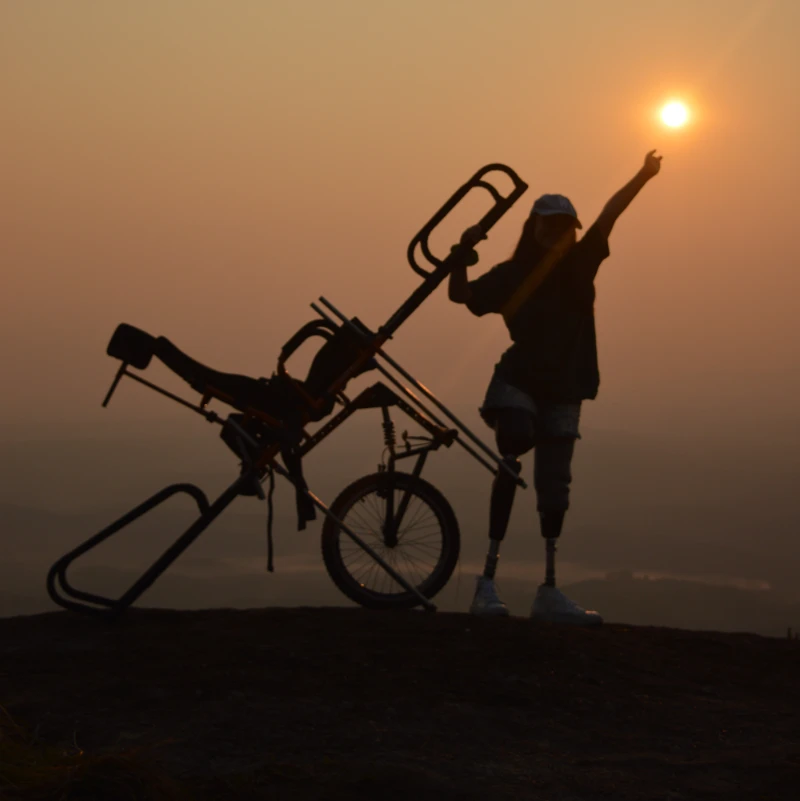
‘Wherever you want to go, I’ll take you!’
That was the promise Guilherme Simões Cordeiro made to his wife, Juliana Tozzi, after she was diagnosed with paraneoplastic cerebellar degeneration—a rare neurological syndrome—during her pregnancy with Benjamin.
With Juliana’s mobility reduced, the couple—passionate about trails, mountains, and travel—sought alternatives to ensure their outdoor lifestyle wasn’t lost. Realizing there was no equipment in Brazil that would allow Juliana to access the mountains, Guilherme developed the Julietti, an adaptive chair designed especially for his wife. Today, Julietti is a national reference for accessibility and mobilizes volunteer groups across Brazil.
The story gained visibility in the media, including on the program Esporte Espetacular. “We realized there were many other people who could also benefit from the equipment. So we started thinking of ways to expand access to the chairs.”
Wishing to provide others with disabilities the same nature experiences Juliana had, the couple founded the Instituto Montanha para Todos, encouraging the shared use of the equipment. Today, Guilherme and Juliana run a Julietti chair factory in Santa Catarina, give lectures, and produce documentaries for TV Globo.
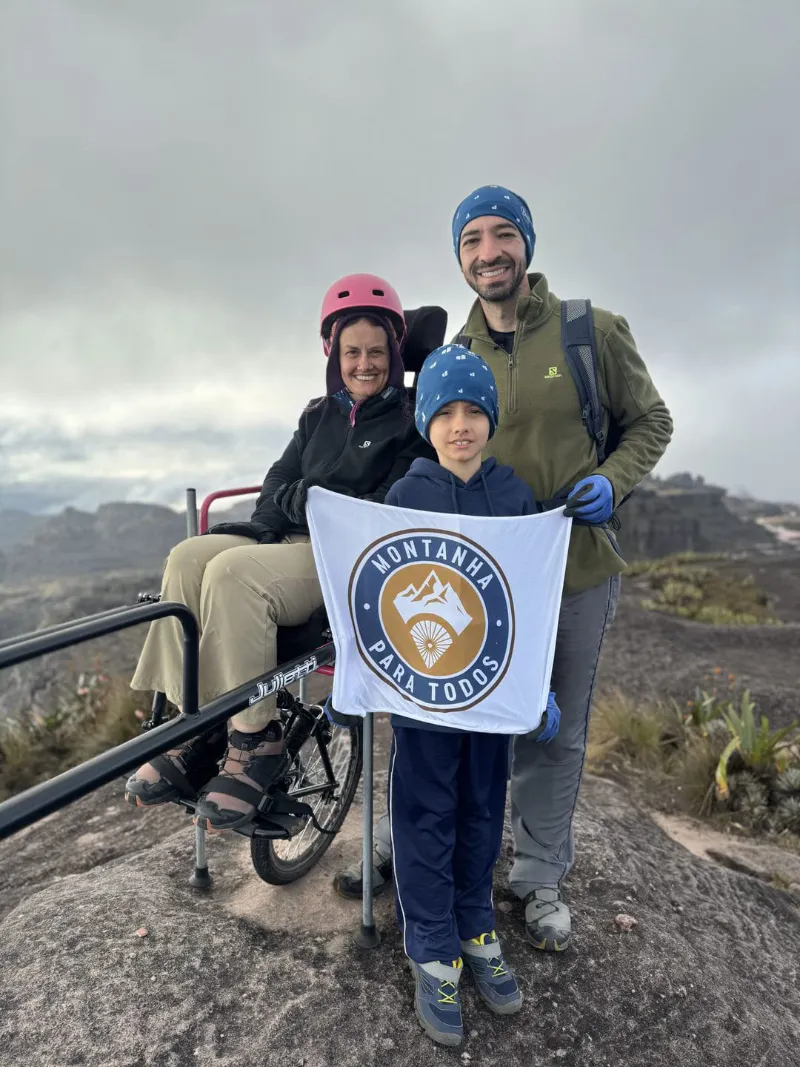
“In one year, we sold 1,200 chairs to the public sector, destined for urban conservation areas such as plazas, botanical gardens, zoos, and also municipal and state parks. We proved that equipping these spaces was much cheaper than carrying out construction work. We want people with disabilities to have access to the chairs and choose the paths they want to explore—not just those dictated by access ramps.”
Currently, there are over 1,500 Julietti chairs in circulation across all Brazilian states, as well as in the United States and Portugal. The institute also has a representative in Japan. “The equipment is present in places like Fernando de Noronha Marine National Park, Serra da Capivara National Park, Tijuca National Park, and in cities like Niterói, Búzios, Petrópolis, and Teresópolis, among others. All the Chapadas are equipped: Chapada das Mesas, Chapada dos Guimarães, Chapada dos Veadeiros, and Chapada Diamantina—destinations that receive many families seeking accessible outings.”
In Rio de Janeiro, a law passed in 2022 requires that municipal parks and trails provide access to the Julietti chair, making the state a pioneer and, so far, the only one to comply with the mandate.
The Importance of Volunteering
The Julietti chair marked a turning point in access to natural environments for people with disabilities, but Guilherme highlights the crucial role of volunteerism in making mobility more widely available.
“Today, there are several groups working toward this cause. In 2015, almost no one was talking about mountain accessibility, and I hope this work continues steadily, offering outings every week, every two weeks, or at least once a month. The goal is for people to use the chair for free in parks, without having to pay for it.”
How Volunteer Groups Keep the Julietti Chair Mission Alive
Voluntários da Montanha is a social inclusion project founded in 2018 with more than 50 volunteers. Its mission is to give people with special needs and mobility difficulties the opportunity to hike challenging trails and reach mountain summits. Based in Joinville, the group promotes the mission of Montanha para Todos and has become one of the most active initiatives, serving as a model for others.
In 2018, Alan Jacob, founder of the movement, fulfilled the dream of Sara, a 13-year-old with a disability, to visit Castelos do Bugres mountain in Joinville after she saw a photo of her mother rappelling there. “We didn’t have the chair yet, but we gathered a group and managed to carry her in a special backpack since she weighed about 20 kilos. We created a playful activity called ‘Sara’s Castle’. In addition to reaching the summit, we gave her the chance to rappel herself.”
A few months later, Alan discovered Montanha para Todos and learned about a nationwide fundraising campaign for a Julietti chair, organized in partnership with WMAI Brasil (Wilderness Medical Associates International), CamelBak Brasil, and Gear Tips. “The chair had no assigned destination, and we were able to bring it to Joinville. That’s when we created the Voluntários da Montanha group.”
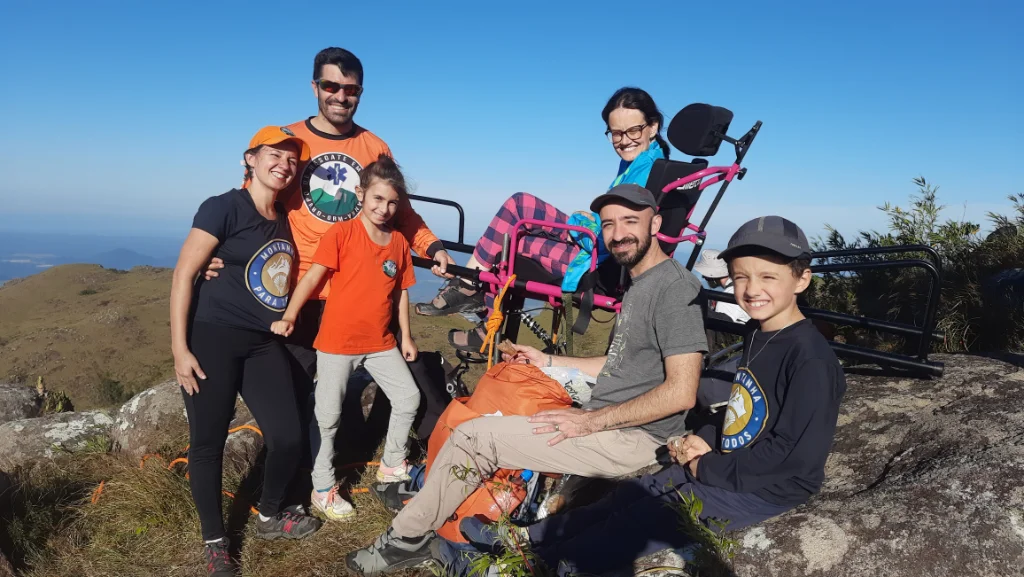
Today, the project holds weekly activities at Mirante de Joinville and up to two outings per month on trails and mountains. Destinations include the Galheta trail in the Armação region and other beach and mountain trails.
“If we’re going to try, we’re going to make it!”
In 2023, Voluntários da Montanha took on the challenge of fulfilling Filipe Ferreira’s 12-year dream of returning to Pico da Pedra, located in Camboriú. After researching the destination, Alan realized the mission was tough but doable—if the volunteer group was willing. And everyone agreed immediately!
“The trail is steep, with sections of rock scrambling. We assembled a team of 40 members and brought all the vertical rescue equipment from the Mountain Rescue Group. We also had experienced professionals who ensured safety during the hike. From this challenge, we recognized the group’s potential to take people to even more demanding places,” says Alan.
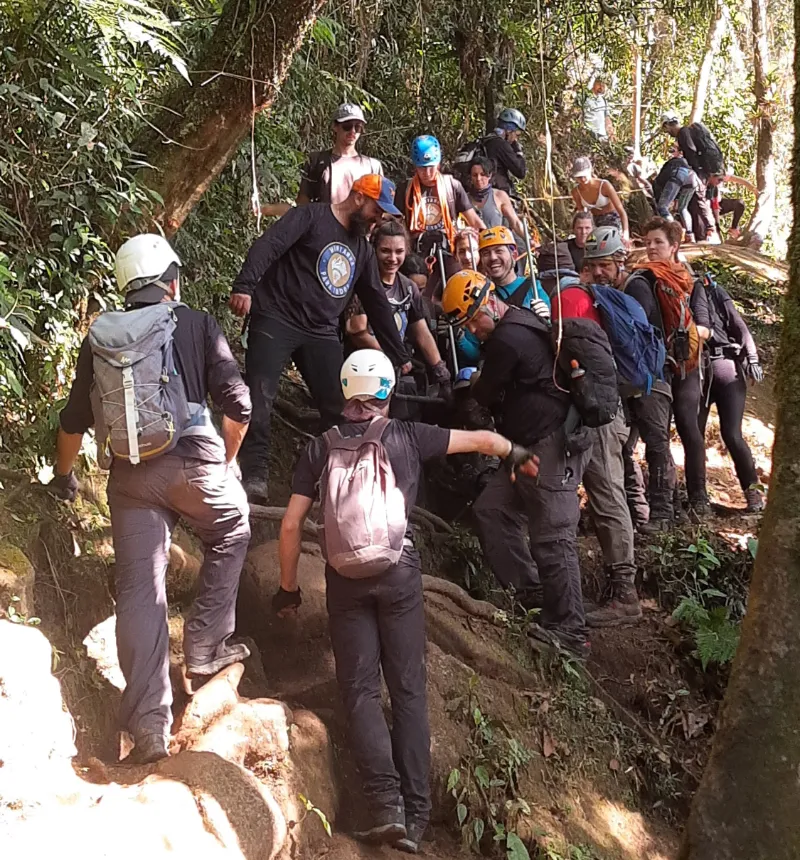
In addition to working with its own volunteers, the project coordinates activities with other groups that also have the Julietti chair. In 2025, Voluntários da Montanha joined forces with Inclusão & Aventura from Curitiba and a group from Balneário Camboriú to organize an activity with three chairs. “We covered 7 km. In some sections there were fallen trees, but we faced the challenges because the volunteers believed in the mission,” says Ramiro Baggenstoss, one of the project’s first volunteers who helps with coordination.
Experiences That Change Lives
Alan explains that from the beginning of the movement, it was clear that the activities organized by Voluntários da Montanha were saving lives. “When people with disabilities discover the chair and a group of volunteers, they feel just like us. If they reached the top of a mountain with the help of someone and the right equipment, they can do anything.”
Ramiro recalls the moving story of a 13-year-old boy who was fully dependent on care. “After the second activity, one of the professionals who supports him told us he began showing more interest in daily tasks. Today, he can already walk with assistance and even mutter a few words.”
Psychologist Andrea Lorena da Costa Stravogiannis states that natural environments reduce anxiety, boost intrinsic motivation, and promote prosocial behavior. “Outdoor activities can complement speech therapy and psychotherapy treatments. They also promote stronger family bonds since everyone can participate.”
But the benefits of projects like Voluntários da Montanha are not limited to people with disabilities. “I noticed that many volunteers who started joining the group were also facing personal challenges. Some were recovering from serious illnesses like cancer and found in helping others a source of hope and renewal,” Alan shares.
The Mountaineer Who Inspires People with Disabilities and Their Families
Robson Lopes Roque is a mountaineer who always dreamed of helping others enjoy the outdoors. After learning about the Montanha para Todos movement, he decided to take a new path: the Inclusão & Aventura project, founded in 2020 in Curitiba. Since then, the initiative has provided experiences for over 40 people, including hikes with the Julietti chair, special backpacks, and other outdoor adventures.
Recently, Inclusão & Aventura organized a waterfall hike in Vale dos Canivetes with two participants with disabilities: Arthur and Murilo, a 6-year-old boy who uses a wheelchair and is also autistic. “We always ask what they’d like to do. This time, they surprised us by saying they wanted to see a train. So, we came up with the idea of combining the train tracks with the waterfall trail,” says Robson.
He gets emotional recalling Murilo’s experience. “His expression changed completely during the hike. He started out serious, but by the end he was smiling, communicating, and talking about the train and the water. I imagine the long-term impact of that moment. These kids go through constant therapy, medical appointments, and school routines. But when do they get time to just play? When do they experience the things typical of childhood? They’ll carry this memory forever.”
That was the second time Murilo, accompanied by his father Marcelo Gonzaga and his mother, participated in activities promoted by Inclusão & Aventura. The family, originally from Pernambuco, moved to Curitiba seeking treatment for Murilo’s diagnoses of myelomeningocele and hydrocephalus. Although Murilo can move his legs, he has difficulty standing on his own.
“His desire to be in nature, to hike, to have contact with water and earth has always been strong. When we found out about Inclusão & Aventura, we completed a 12 km hike with the Julietti chair in Mandirituba, Paraná. During this last experience in Vale dos Canivetes, he rode on my back in a backpack,” Marcelo recounts.
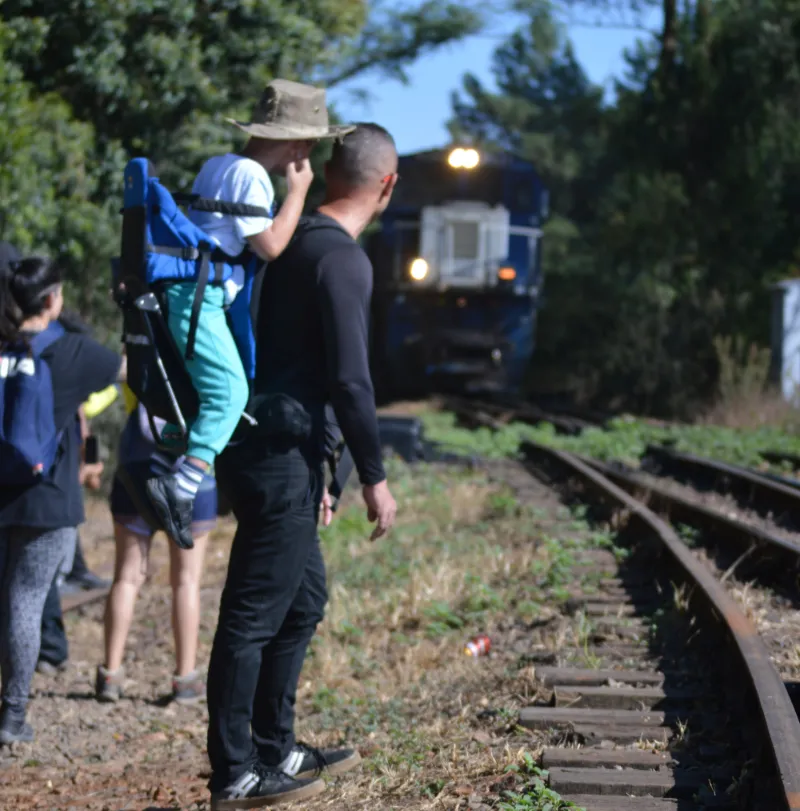
Marcelo is amazed by Murilo’s progress on each hike. “Knowing that he can swim, take a waterfall bath, and be on the mountain without fear really helps his development. At Vale dos Canivetes, he stood in the water with his mom. The plan is to keep exploring more trails.”
Marcelo is also part of the 25-member volunteer group of Inclusão & Aventura. “These are unique experiences I’ll carry with me for life. They are opportunities for Murilo and other children to see that just like everyone else, they can do it too.”
That’s the spirit with which Robson leads Inclusão & Aventura. “We’re a group of friends, a family. We all want to do something together, regardless of who can walk or not. We’re happy, and so are they. With that, we make the world a little better.”
In addition to trails around Curitiba, Inclusão & Aventura has tackled even more challenging routes for people with disabilities, such as the trails of Morro Camapuã and Morro do Getúlio. “Camapuã is considered moderately difficult, with many roots, rocks, and a ramp that would be inaccessible without the group. The trail to Morro do Getúlio—the first peak on the route to Pico Paraná in Pico Paraná State Park—is a hard climb, but we went with a large team. We formed a line of volunteers and passed the chair hand to hand. It was an emotional experience because we overcame a major challenge.”
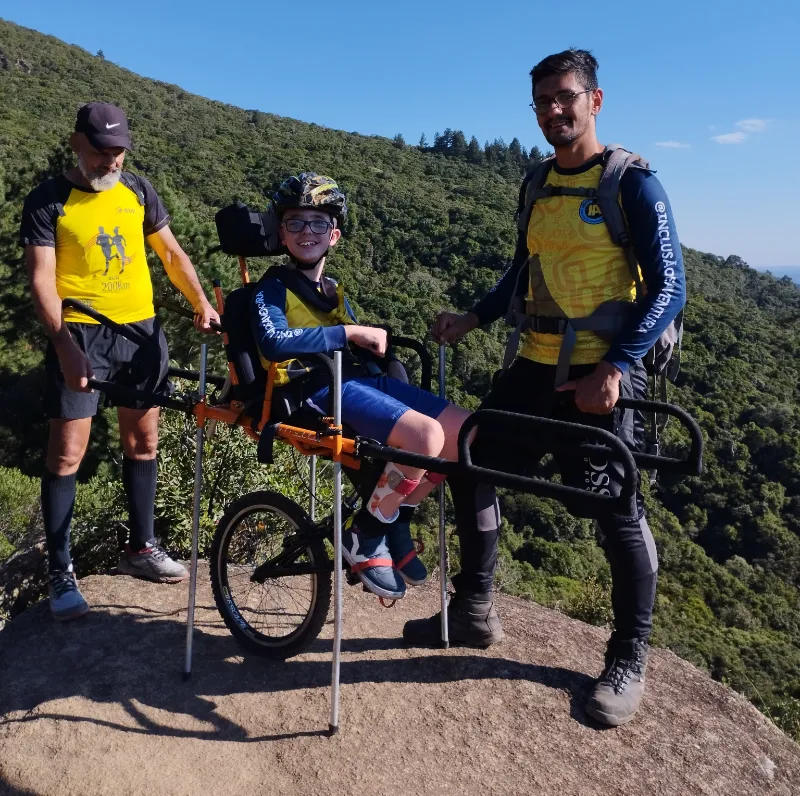
Inclusive Experiences Revive Memories and Fulfill Dreams
The NGO Montanha em Movimento, created by biologist and mountaineer Thiago Montenegro, was responsible for fulfilling Bruno Dutra’s wish to return to Costão do Itacoatiara.
“When Thiago invited me, I imagined I’d hike the trail with half a dozen people. But when I arrived, there were about 100 volunteers! I felt safe with the movement and its structure. It was a chance to be there with my children—something that normally wouldn’t happen.”
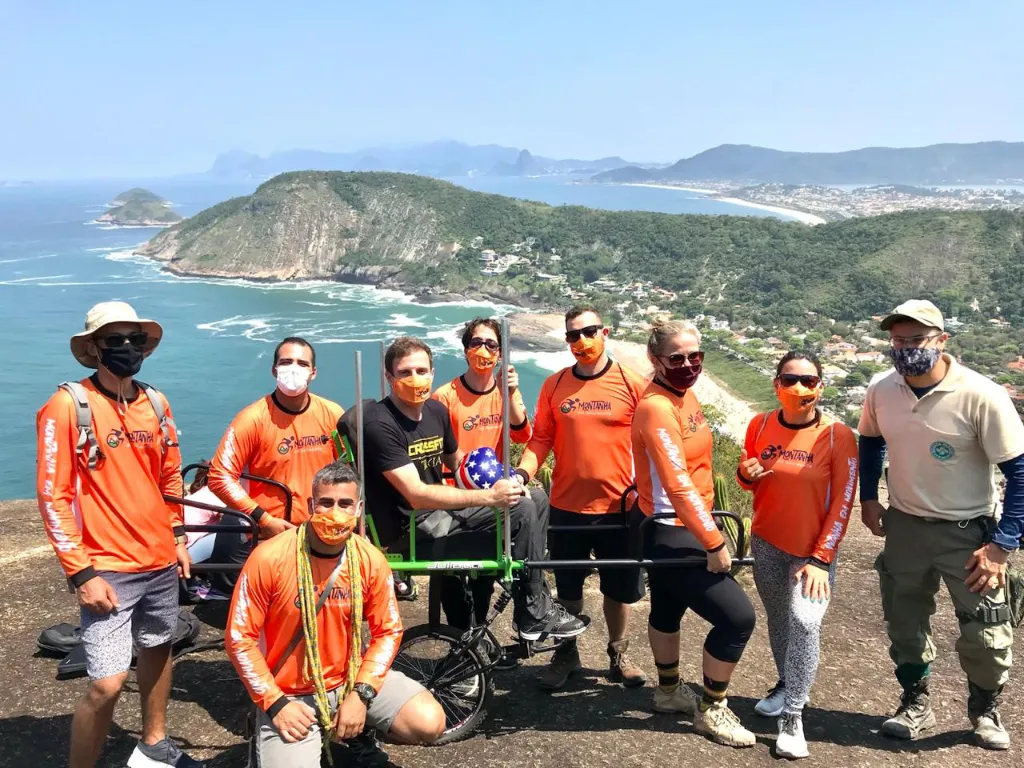
The desire to found Montanha em Movimento came from a personal experience shared by Thiago and Patricia Mira, co-founder and vice-president of the NGO. “Thiago had a deep sense of injustice and selfishness regarding the inclusion of people with disabilities in nature. One day, we took a friend with limited mobility on a simple hike. When he fell during the trail, Thiago carried him on his back. It was a great experience for him and for us.”
From that moment on, the pair began taking the first steps to contribute to accessible outdoor activities in the region of Niterói, Rio de Janeiro. Through his research and drive, Thiago discovered the Julietti chair and a São Paulo-based movement already organizing inclusive hikes. Together, they took a person with a disability to the summit of Pedra da Gávea.
In 2021, Montanha em Movimento was born to improve the quality of life of people with disabilities. The very first outing was with Bruno on a hike to a waterfall. “That day, there were more than 40 volunteers. The energy was amazing. We haven’t stopped since,” says Patricia.
The NGO has already impacted 80 people with disabilities, with activities in the Tijuca Forest, Alto Mourão, Pedra do Elefante, Travessia Tupinambá, Parque da Cidade, and waterfalls in nearby towns. “We even had a marriage proposal on the Travessia Tupinambá! We’ve also organized a sunrise experience—an early morning hike to watch the sun rise from a mountaintop. In addition, we’ve done rappelling, rafting, and canoeing.”
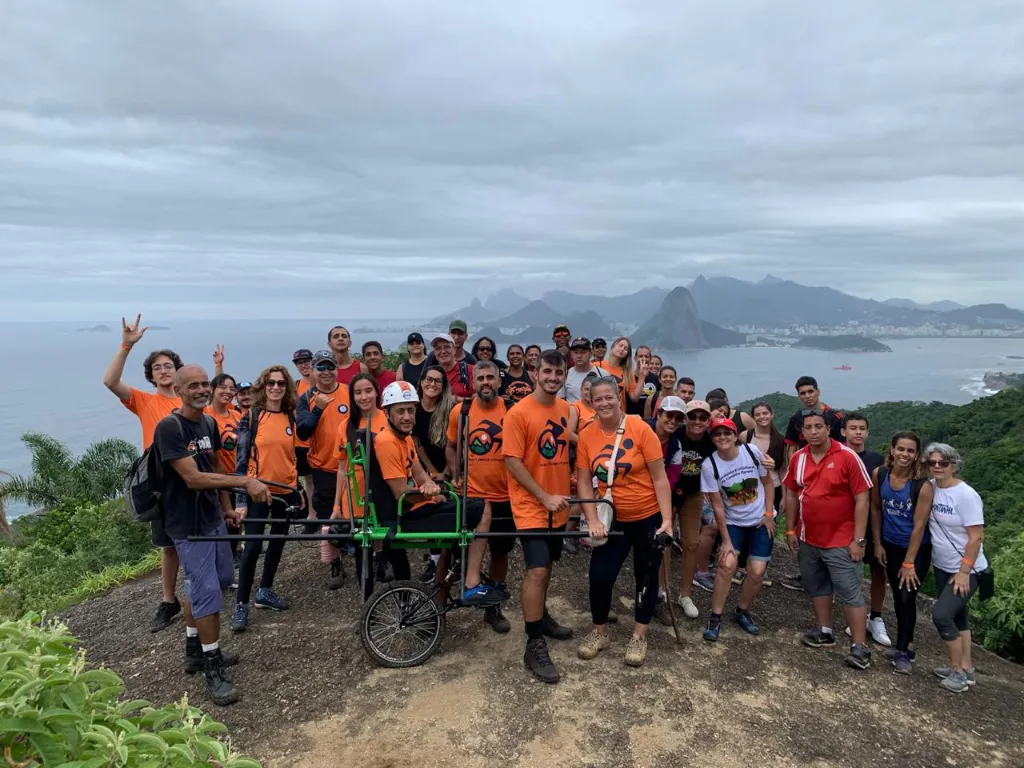
Montanha em Movimento also partners with Ecoarte, an ecological project that offers interpretive hikes with support from biologists and visits to the local state park.
Program for Visually Impaired Children Promotes Integrative Experiences
Promoting the exchange of experiences between children with and without visual impairments through free outdoor sports activities is the main goal of the Natureza de Criança Inclusivo, created by Isabela Abreu. Targeted at children and teens aged 6 to 16, the program has already reached more than 400 families and features canoeing as its main activity.
During a full day of outdoor fun in a protected area of the Atlantic Forest, children learn to paddle, swim in the river, hike through the forest, listen to storytelling, and participate in other playful activities in nature. The program is endorsed by the Ministry of Citizenship and supported by the Sports Incentive Law.
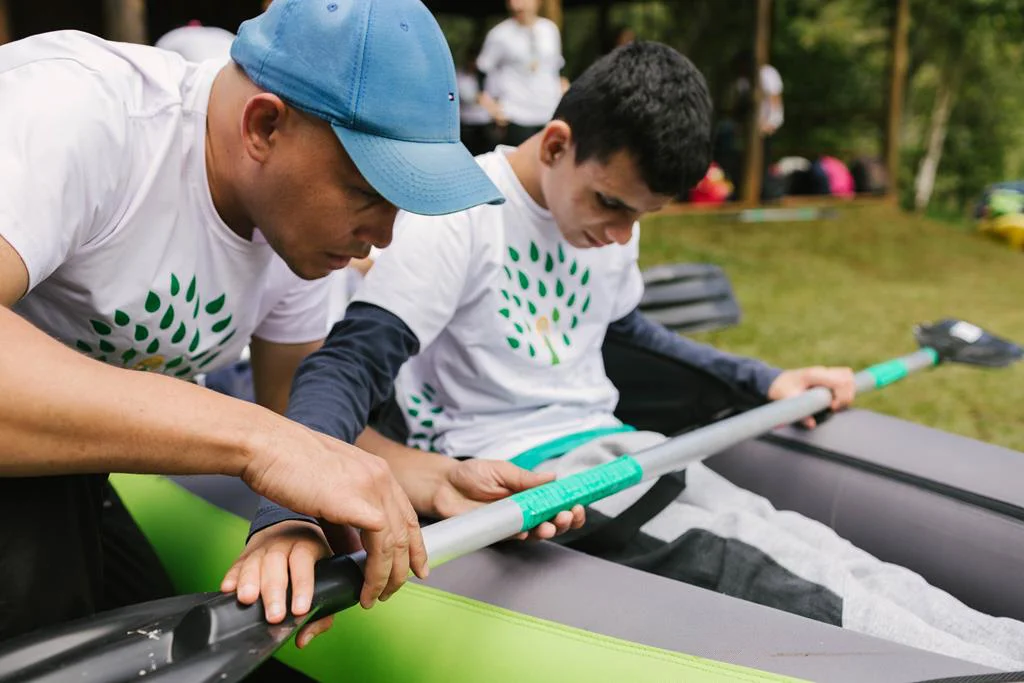
Isabela’s interest in inclusion initiatives began around 2005 with the creation of a project for wheelchair users. But after a conversation with her aunt, everything changed. “I shared the idea with her—she was a volunteer English teacher at an institution for blind people—and she suggested we do the project with her students. At first, I was surprised, thinking they wouldn’t be able to see the beauty of nature. That’s when I had my first lesson in inclusion. She told me about the world of blindness, about heightened perception through other senses, and she convinced me.”
That was the beginning of a pilot project at her beach house in Riviera de São Lourenço, São Paulo, where 15 blind adults were accompanied by 15 volunteer friends. The experience was the foundation for the creation of Grupo Terra, which became the NGO Instituto Terra two years later and hosted events with up to 300 participants—150 blind and 150 sighted.
That’s where Isabela met her former husband, who was visually impaired. They married and had a child. “After six years leading the NGO, I stepped down, but I already knew I wanted to develop a project involving children with and without visual disabilities. I wanted other kids, like my daughter, to grow up alongside blind children. This way, they’d also break down prejudices and barriers.”
Since 2022, Natureza de Criança Inclusivo has not only impacted children and teens but has also created opportunities for families. “We impact both the families of blind children—who get access to sports for the first time—and children without disabilities, who, by engaging with blindness in nature, realize that kids with disabilities exist. In addition to sharing nature’s benefits with blind children, we involve society in a broader inclusion process,” says Isabela, who also teaches courses for educators.
The biggest lesson learned by Isabela and her team at Natureza de Criança Inclusivo is to focus on possibilities rather than limitations, bringing more opportunities to underprivileged children.
“Access to nature is more limited for children with disabilities because it’s often far from where they live and linked to paid activities. There’s also a lack of awareness among families about the benefits of outdoor activities, as their priorities usually involve cognitive and motor development—like speech therapy and daily appointments. As a result, children with disabilities end up with less time to experience nature.”
People with Intellectual Disabilities Prepare for Inclusion in the Job Market
The Borboleta Azul Program, a partnership between Outward Bound Brasil (OBB) and the Instituto Jô Clemente (formerly APAE SP), has been running since 2010 and has had a positive impact on the lives of young people and adults with intellectual disabilities. The project has already supported 214 participants across 20 nature expeditions.
By developing socio-emotional intelligence, the program aims to unlock their potential and prepare them for inclusion in the job market. It seeks to break through perceived limitations and strengthen skills such as self-esteem, self-confidence, autonomy, and communication.
During four days in a remote area of the Campos do Jordão region, participants face physical and emotional challenges on the trails, promoting both individual and group growth. “They take part in planning, hiking, setting up and taking down camp, kitchen management, and sanitation and hygiene routines. You quickly see their capacity to adapt and learn. They develop autonomy, self-leadership, and other core skills,” says Humberto Medaglia, OBB instructor.
Throughout the expedition, participants are divided into work groups, each responsible for camp, meals, and safety. These responsibilities encourage social interaction and demand leadership, decision-making, and negotiation—challenges they will later encounter in professional settings.
For many, it is their first time away from family, offering a unique opportunity to overcome fears and discover new abilities. “We take these participants out of their comfort zones and into nature. They step away from parental overprotection during the expedition.”
Humberto notes that tasks like staying hydrated, managing personal hygiene, and cooking for a group present a new reality in which they must learn to care for themselves, for others, and for their environment. “In the workplace, sometimes they’ll be leaders, other times team members. They’ll have to handle frustration, negotiate, do things they’ve never done, and face prejudice.”
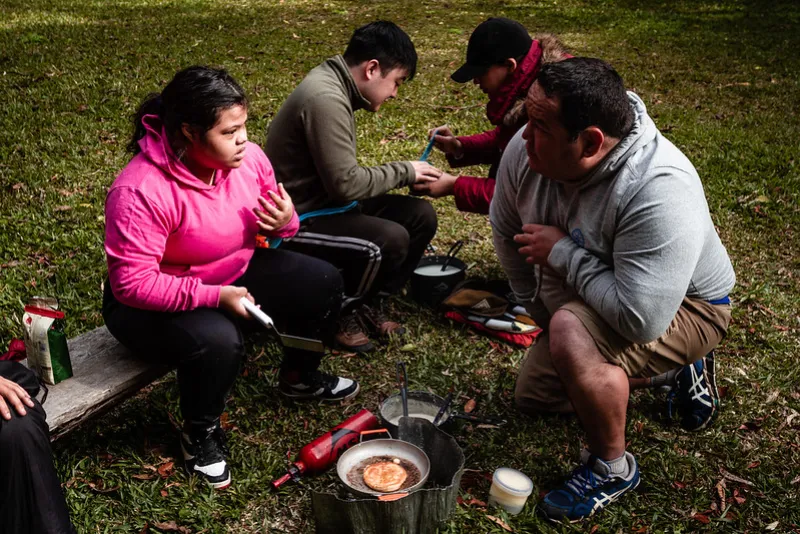
According to neuropsychologist Andrea Lorena, projects like this are essential for developing executive functions such as planning and working memory. “They also enhance a sense of self-efficacy and contribute to building self-esteem.”
By offering an experience that goes beyond conventional expectations, Borboleta Azul helps build a more inclusive and compassionate society. Participants leave the program with renewed confidence in their abilities, greater independence to face everyday challenges, and a lasting sense of achievement—ready, in other words, to fly.
This post is also available in: Português (Portuguese (Brazil)) Español (Spanish)
